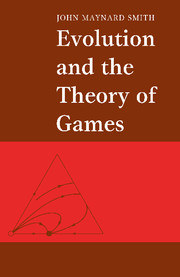Book contents
- Frontmatter
- Contents
- Preface
- 1 Introduction
- 2 The basic model
- 3 The war of attrition
- 4 Games with genetic models
- 5 Learning the ESS
- 6 Mixed strategies – I. A classification of mechanisms
- 7 Mixed strategies – II. Examples
- 8 Asymmetric games – I. Ownership
- 9 Asymmetric games – II. A classification, and some illustrative examples
- 10 Asymmetric games – III. Sex and generation games
- 11 Life history strategies and the size game
- 12 Honesty, bargaining and commitment
- 13 The evolution of cooperation
- 14 Postscript
- Appendixes
- Explanation of main terms
- References
- Subject index
- Author index
12 - Honesty, bargaining and commitment
Published online by Cambridge University Press: 05 June 2012
- Frontmatter
- Contents
- Preface
- 1 Introduction
- 2 The basic model
- 3 The war of attrition
- 4 Games with genetic models
- 5 Learning the ESS
- 6 Mixed strategies – I. A classification of mechanisms
- 7 Mixed strategies – II. Examples
- 8 Asymmetric games – I. Ownership
- 9 Asymmetric games – II. A classification, and some illustrative examples
- 10 Asymmetric games – III. Sex and generation games
- 11 Life history strategies and the size game
- 12 Honesty, bargaining and commitment
- 13 The evolution of cooperation
- 14 Postscript
- Appendixes
- Explanation of main terms
- References
- Subject index
- Author index
Summary
This chapter is concerned with the transfer of information during contests. The process is not well understood from a game-theoretic point of view. A considerable body of data exists, but has in the main been collected by ethologists, who did not appreciate that there are difficulties in understanding why selection should favour the giving of information in such situations. Consequently, the behaviour has often not been related to the contexts in which it occurs in nature, or to its effects on fitness. A proper understanding will be impossible until these cases have been re-analysed in the light of an adequate evolutionary theory.
In the meanwhile, I shall review some of the relevant facts and suggest some possible explanations. In doing so, I have deliberately used human analogies to suggest hypotheses. Of course, students of animal behaviour do this all the time, and I am no exception. The proper procedure, however, is to reformulate the hypothesis, once found, in terms of a population model; if this cannot be done, the hypothesis is inadmissible. I have tried to indicate how this could be done for the ideas discussed here, but the models are worked out in less detail than they should be. My excuse is that a more detailed articulation of the models is unjustified until relevant data are available. This chapter should therefore be treated as speculation about the direction, empirical and theoretical, that research should take.
- Type
- Chapter
- Information
- Evolution and the Theory of Games , pp. 147 - 166Publisher: Cambridge University PressPrint publication year: 1982



